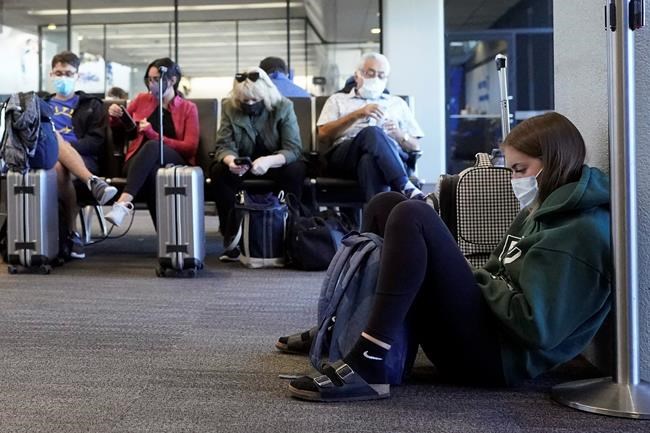CDC: ‘Strong recommendation’ but no rule for masks on planes
Advertisement
Read this article for free:
or
Already have an account? Log in here »
To continue reading, please subscribe:
Monthly Digital Subscription
$0 for the first 4 weeks*
- Enjoy unlimited reading on winnipegfreepress.com
- Read the E-Edition, our digital replica newspaper
- Access News Break, our award-winning app
- Play interactive puzzles
*No charge for 4 weeks then price increases to the regular rate of $19.00 plus GST every four weeks. Offer available to new and qualified returning subscribers only. Cancel any time.
Monthly Digital Subscription
$4.75/week*
- Enjoy unlimited reading on winnipegfreepress.com
- Read the E-Edition, our digital replica newspaper
- Access News Break, our award-winning app
- Play interactive puzzles
*Billed as $19 plus GST every four weeks. Cancel any time.
To continue reading, please subscribe:
Add Free Press access to your Brandon Sun subscription for only an additional
$1 for the first 4 weeks*
*Your next subscription payment will increase by $1.00 and you will be charged $16.99 plus GST for four weeks. After four weeks, your payment will increase to $23.99 plus GST every four weeks.
Read unlimited articles for free today:
or
Already have an account? Log in here »
Hey there, time traveller!
This article was published 20/10/2020 (1881 days ago), so information in it may no longer be current.
The government’s top public health agency is raising the importance of wearing face masks on planes, trains and buses, although the Trump administration has resisted making masks mandatory for travellers.
The Centers for Disease Control and Prevention issued new interim guidelines for travellers, including a “strong recommendation” to wear face coverings to slow the spread of COVID-19.
“Transmission of the virus through travel has led to — and continues to lead to — interstate and international spread of the virus,” the CDC said in a statement. “Local transmission can grow quickly into interstate and international transmission when infected persons travel on public conveyances without wearing a mask and with others who are not wearing masks.”

The CDC said its advice on masks should be followed by passengers and workers on planes, ferries, trains, subways, buses, taxis and ride-sharing vehicles, including in airports and at subway and bus stations.
The new guidance issued Monday includes more specific advice for travellers than CDC has previously given. The agency said it was offering the new recommendations to support state and local health officials and transportation operators who have imposed their own mask rules.
Travellers are often in close contact with others people, sometimes for several hours, raising the risk of contracting or spreading the virus that causes COVID-19. Masks are necessary because travellers might not be able to keep six feet apart from others on planes and buses, CDC said.
All leading U.S. airlines require passengers other than small children to wear masks during flights, but enforcement can be spotty. The Federal Aviation Administration has declined to require masks, passing over requests by airline labour groups and some Democratic lawmakers. Instead, the Transportation Department and other agencies issued health guidelines in July that left mask requirements and enforcement to individual airlines.


